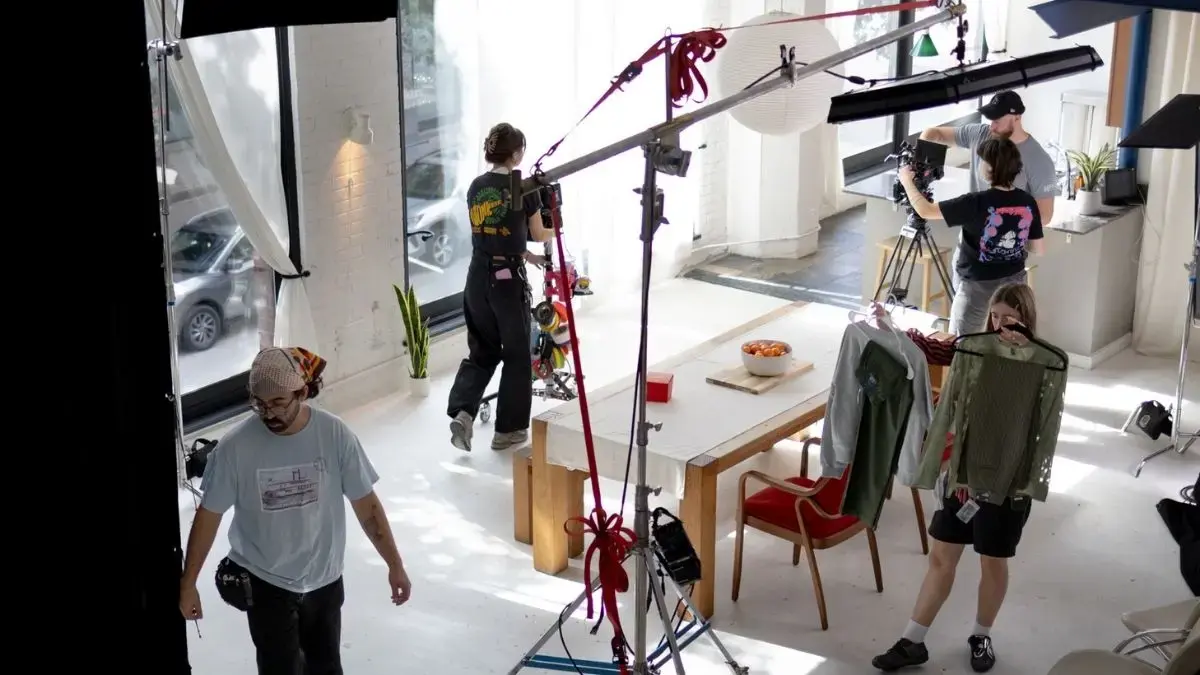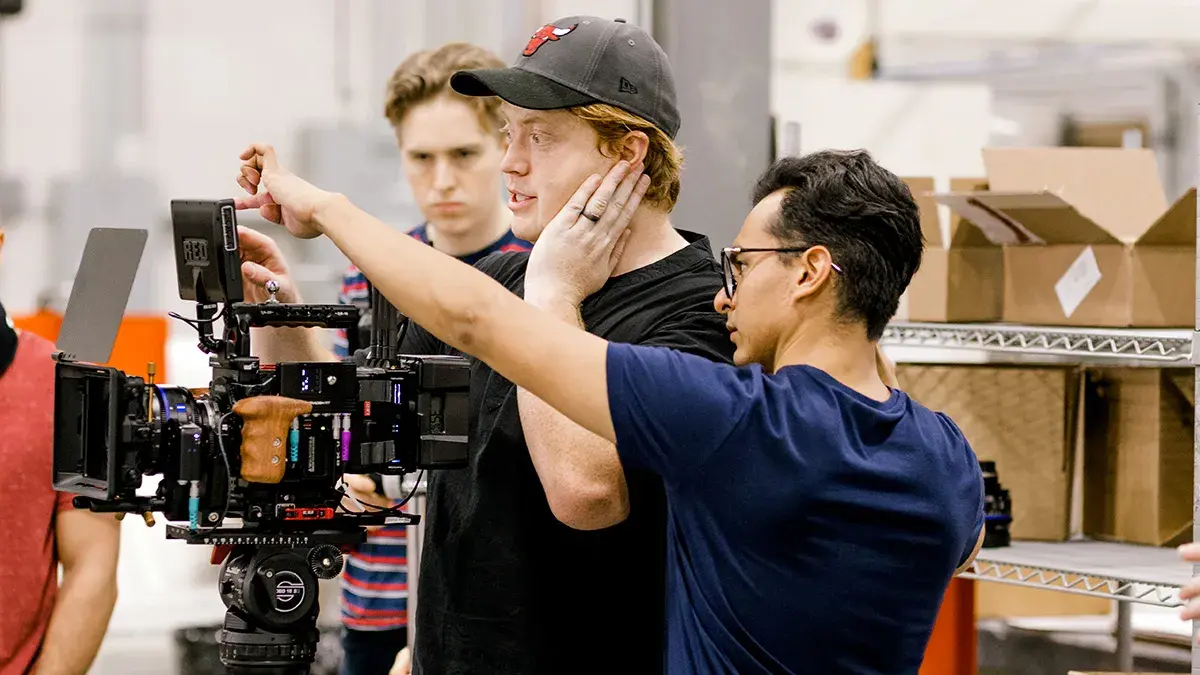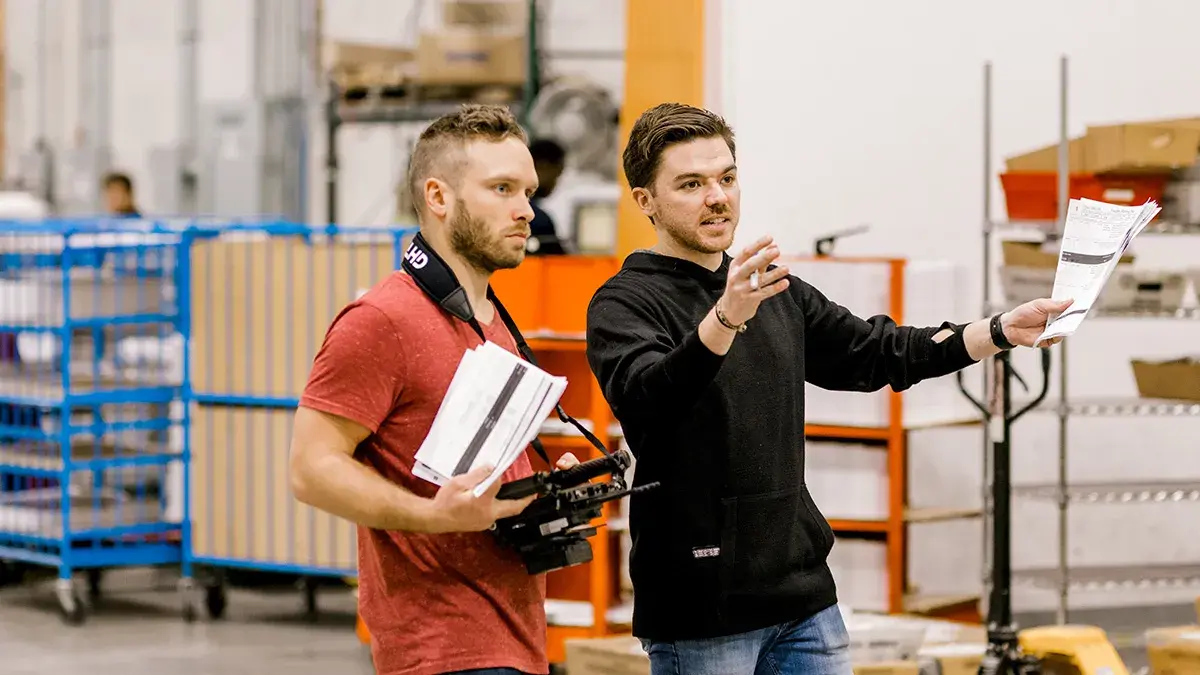Corporate vs. Small Business Video Production in Chicago
With close to 10 million residents, the Chicago area has an expansive population of potential customers and clients for your business. Video content...
▶ Video Strategy & Discovery
A video marketing strategy will keep your production cohesive and on schedule.
▶ Creative Treatments, Scripts & Storyboards
Bring your vision to life with professional scriptwriting and storyboarding services.
▶ Production Preparation
Prepare for your corporate video with professional video production services.
▶ Full Service Filming Days
Discover how Charter & Co can help you bring your vision to life through expert on-set filming services.
▶ Video Editing, Color Grading & Sound Design
Elevate your video marketing with Charter & Co’s expert video editing and post-production services.
▶ Motion Graphics
Captivate audiences with videos, ads, and social media that include high-quality animations.
▶ Licensed Music & Voiceovers
Elevate your videos with high-quality music licensing and voiceover services.
▶ Distribution Strategy & Advertising Support
Get your content noticed with a comprehensive video distribution strategy.
▶ Everything Video Marketing
Video marketing resources: What it is, why it matters, and how to do it.
▶ Everything Video Production
Your ultimate guide to video production resources: Tips and tricks for creating masterful videos.
▶ Blog
Helpful Blog resources for all of your video production and marketing needs.

From short-form social media reels to conference livestreams, corporate video production can significantly amplify your organization's marketing and communication. The right content can establish social proof, set clear expectations for your brand, and even help you build successful brand partnerships.
Discover the benefits of corporate video production services to strategize your next video project.
Corporate video production is the process of creating various types of video content for a company's use, such as internal training videos, product demonstrations, and social media advertisements. From a marketing perspective, videos can help grab potential customers' attention and quickly and clearly deliver your message. Internally, corporate videos provide crucial information about operations and safety, ensuring everyone is on the same page.
Corporate videos are critical in today's digital age, whether you hook potential clients using social media reels or develop attention-grabbing training videos tailored to your team's interests. The actual production process is also crucial, as your video quality and project cohesiveness significantly impact how long you'll hold people's attention and how effectively you'll convey your message.
Video is a unique medium that combines audio and visual elements, allowing you to share your message on the screen and through sound. This makes it easier to grab and hold viewers' attention, especially if you enhance videos with visual effects and engaging text. Video can also improve the communication of hybrid and virtual teams, recreating the feeling of meeting and talking in person without the need for a commute.
From social media videos to virtual meetings, video has become a vital component of business operations and internal communication. Video marketing can reframe your message and help you reach significantly wider audiences, whether you invest in a paid promotion or simply 'play' the social media algorithms. Meanwhile, enhancing your video quality for virtual meetings and company livestreams, such as conferences, can help maintain attendees' attention and prevent important information from being missed.
While many marketing videos have indirect goals, such as branding or awareness, others directly drive conversions through sales, sign-ups, and other calls to action (CTAs). Tracking your conversion statistics, return on investment (ROI), and engagement rates for each video can help you identify the most effective marketing strategies. This will help you hone in on the best types of videos and platforms for your unique audience.
High-quality corporate video production can also drive greater awareness and social proof about your offerings. For example, product demos, customer testimonials, and influencer videos can show the benefits of your products or services in action. Videos that encourage viewers to comment or engage with your content can help build relationships and trust, while also increasing the likelihood of your videos appearing in their social media algorithms.
Explore the following types of corporate video content to inform your strategy for the next project.
Product and explainer videos break down your product or service using various visual elements, including demonstrations, graphic text, and animated blueprints and schematics. They tell potential customers exactly what to expect if they buy your product, making them ideal for social media and your website's product and service pages.
Customer testimonials provide valuable insights into your brand, product, or service from the perspectives of actual customers and clients. For example, if you offer business-to-business (B2B) software, testimonials from satisfied customers can explain how your solutions have met organizations' exact needs.
Meanwhile, brand stories share a bit about your organization from your perspective. They spotlight your business's mission, values, and greatest strengths to establish a clear brand identity.
Recruitment and training videos make it easy to bring new hires onto your team, adopt new practices, and adhere to training requirements. Additionally, training videos ensure everyone receives the same instructions, facilitating easier and more cohesive operations.
Your corporate video content should be unique to your business, highlighting your company culture and practices. Professional corporate video production services can help you hone in on your organization's greatest strengths and your videos' central messages.
Now that you know what corporate video production is, it's time to get started on your project. First, set measurable objectives for your video content. For example, are you more interested in a direct ROI or long-term results from growing your brand?
Next, research your target audience, including their key demographics, preferred social media platforms, and the immediate needs your products or services will address. For instance, are you marketing to general consumers, frequent travelers, B2B organization leaders, or someone else entirely?
Learning as much as possible about your target audience and project goals will lay clear groundwork for your video marketing strategy. A reasonable ROI goal will guide you as you set your budget, while understanding your market's behavior helps you identify the best types of videos and social media platforms to use.
Explore the three key stages of video production.
During this stage, your production team develops a clear roadmap for the rest of your project. Key steps include:
Scripting and concept development: First, we'll develop, write, and revise your project's script based on your original concept, whether you're using a single voiceover or multiple actors with distinct dialogue.
Storyboarding and visual planning: Next, we'll develop storyboards and shot lists to visualize your final video. This establishes a clear, cohesive vision for the entire production team, making it easier to plan the types of equipment needed on the production day.
Budgeting for equipment, talent, and locations: Once we determine what we're capturing, we'll establish a fixed budget for your project that allocates funds appropriately among departments. Key budget considerations include equipment, crew, talent, location fees, production days, art, catering, and post-production.
Choosing the right team or vendor: Working with a professional production team can significantly expand the opportunities available for your project while simplifying your workload as a producer. Many teams also offer their own production crews, cameras, and equipment, helping to minimize overall costs.
Once everything is planned, you'll proceed with the actual corporate video production. How long this stage takes ultimately depends on your project — you can typically capture basic footage with just one location in a day or two, while in-depth productions may take weeks or more.
The key roles during production include:
Producers oversee production on set to keep everything on track and aligned with the project's original mission and stakeholder input, even if everything is already planned.
Directors work with talent and most departments to capture footage as envisioned.
Assistant directors are similar to stage managers in the theater, managing communication between departments and keeping production on schedule.
Talent includes your lovely actors and extras who appear on camera.
The camera department, led by the Director of Photography, handles the on-screen visuals. This should be the only department that touches your production's camera equipment.
The sound department collaborates closely with the camera department to capture high-quality audio, often keeping microphones discreet and out of sight. They also capture room tone and other sound effects for use during post-production.
Gaffers use various types of equipment to refine your video's lighting, creating a balanced final look that focuses on your subjects.
The art department handles set decorations, props, hair, makeup, and various other on-screen visuals, maintaining continuity and honing in on your color palette.
Finally, you'll move into post-production, which covers multiple key steps:
Editing for story and pacing: Experienced video editors will carefully juxtapose your footage into a crisp video that aligns with your project goals and expected runtime. They'll browse all the footage captured in production, using only the best options.
Adding graphics, music, and voiceovers: Graphic text, visual effects, and animations can further enhance your video's appearance and keep viewers engaged for at least a few extra seconds. Voiceovers, music, and sound effects can then improve your video's audio for a more immersive and informative experience.
Revisions and final approvals: Most corporate videos require multiple revisions to achieve an ideal final product that aligns with your business and stakeholder goals. Only work with post-production teams that offer revisions, and thoroughly review video content before giving final approval.
The best ways to share and promote your video depend on your target audience, type of video, and business goals. For instance, a short-form video spotlighting online products may perform well on TikTok, Instagram, and other social media platforms, especially with easy-to-follow CTA elements.
Meanwhile, long-form software demos can tell potential customers everything they need to know on your website's product page. They can also attract steady search engine traffic on YouTube or gain the attention of the right potential clients on LinkedIn.
Consider whether your project would benefit more from owned channels (like your website), earned channels (like social media algorithms), or paid channels (like paid promotions). If you're unsure, adopting a handful of distribution strategies and monitoring your analytics can help you identify your best paths forward.
Measuring your ROI and engagement metrics will help you understand what works and what doesn't for your target audience. Keep an eye on the following key metrics:
Conversions and clicks: Track links to keep count of how many times people use your link from a particular source, such as the number of clicks on the product page linked in your TikTok bio. This can identify which platforms and videos drive the most traffic to your website.
Video engagement: Likes, comments, shares, and views spotlight the videos that people watch and engage with the most. Monitoring all of these metrics rather than just one, such as views or likes, can help you refocus your video content in future posts.
Watch duration: 2,000 people may have seen your Instagram Reel, but how many watched it through to your CTA? Monitoring your videos' average watch times allows you to identify your best-performing types of videos and the elements that capture audiences, such as graphics, music, or an internet trend.
Follow these tips when using video production for corporate marketing:
Embrace storytelling and strong narratives.
Use humor when appropriate.
Keep your video short and focused on your message.
Listen to the creative ideas shared by your production team.
Make your videos accessible with captions and transcripts.
Keep your video content true to your brand, including its look and voice.
Whether you're still developing your concept or searching for dependable equipment and crews, an external marketing video production company can simplify your project and amplify your content. Full-service production teams will guide you through every stage of the process, so that every decision remains true to your concept and business goals. Prioritize experienced teams with diverse skillsets and portfolios to expand your production possibilities.
Contact Charter & Co to get started.
Corporate video production services range from a few hundred to several thousand dollars, depending on the scope of your project. Full-service productions typically cost $2,000 or more, depending on your video's length and the number of production days. Meanwhile, individual services, such as video editing and color grading, are significantly less expensive.
Most corporate videos are between 30 seconds and three minutes long, depending on the type of video. For instance, short-form social media ads should be under a minute long while delivering a concise message. Meanwhile, product demos, explainer videos, and testimonial videos should take more time to focus on the fine details.
Promotional videos focus on specific products and services, typically offering a direct ROI, while corporate videos market your organization and its overall brand for long-term results.
Of course, you can always develop corporate video content in-house, especially if your team already has creative experience and a great concept. After all, many smartphone cameras are powerful enough to capture professional-quality visuals and audio, and some of the best video editing software, such as DaVinci Resolve, is available for free. That said, your possibilities will be significantly limited if you don't work with a professional team and genuine video equipment.
The best places to publish your corporate video content depend on your goals. Marketing videos can help your brand gain visibility on various social media platforms, including LinkedIn, YouTube, TikTok, and Instagram. Meanwhile, product demos and customer testimonials can make great additions to your website, especially for search engine optimization (SEO).

With close to 10 million residents, the Chicago area has an expansive population of potential customers and clients for your business. Video content...

Signs You Need Professional Corporate Video Production Services If you feel like you need help with video marketing, it’s a good sign that your...

Why Is Creative Video Production Important To B2B Marketing? It’s impossible to argue the value of video in digital marketing nowadays. Video...